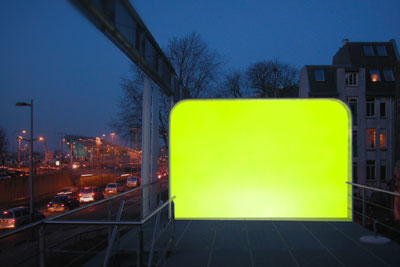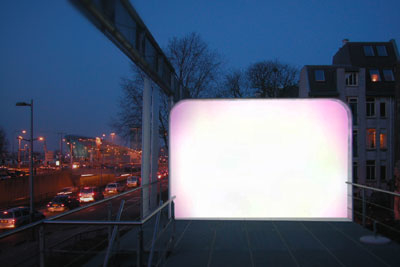The projection begins as darkness falls: Winter rush hour. The audience is waiting in a traffic jam to enter the tunnel under the IJ Canal, returning home in a Northerly direction, in darkness, from their occupations. The audience has travelled the opposite direction the same morning in the same state of darkness, unaware of the physical loss in their daily occupations: Sun. The projection’s aim is to return to the audience that which they have lost.
That which formerly held us together and gave meaning to our occupations was our belief in God. When we transferred this belief first to heroes and then to things, we began to walk our separate paths. That island to which we might have retreated to escape from the impact of the world, lies, as it ever did, within each one of our hearts.
Essentially reversing this process of loss, the series was chromatically ordered, reconstructing Sun’s colour shift from dusk to dawn. The regained loss of light was projected to the following specifications: each image would be projected for 23 seconds, with a one second dissolve between each frame. After 800 images, the projection stops at sunrise the following day, upon the commuters return. The projection is simply a reconstruction of that which was not perceived.
Whenever you wish to reconcile what your senses show you with the soundest teachings of Aristotle, you will have no trouble at all. Does not Aristotle say that because of the great distance, celestial matters cannot be treated very definitely?
He does say so, quite clearly.
Does he not also declare that what sensible experience shows ought to be preferred over any argument, even one that seems to be extremely well founded? And does he not say this positively and without a bit of hesitation?
He does.
Then of the two propositions, both of them Aristotelian doctrines, the second – which says it is necessary to prefer the senses over arguments – is a more solid and definite doctrine than the other, which holds the heavens to be inalterable. Therefore it is better Aristotelian philosophy to say Heaven is alterable because my senses tell me so, than to say, Heaven is inalterable because Aristotle was so persuaded by reasoning. Add to this that we possess a better basis for reasoning about celestial things than Aristotle did. He admitted such perceptions to be very difficult for him by reason of the distance from his senses, and conceded that one whose senses could better represent them would be able to philosophise about them with more certainty. Now we, thanks to the telescope, have brought the heavens thirty or forty times closer to us than they were to Aristotle, so that we can discern many things in them that he could not see; among other things these sunspots, which were absolutely invisible to him. Therefore we can treat of the heavens and Sun more confidently than Aristotle could.

